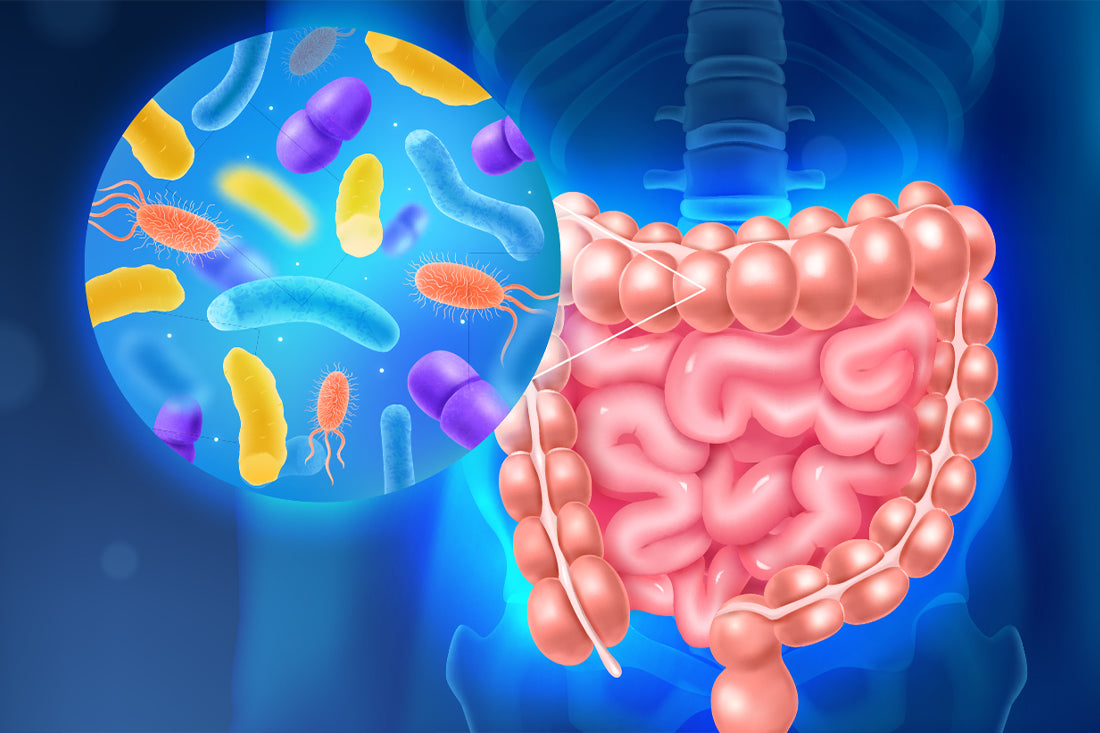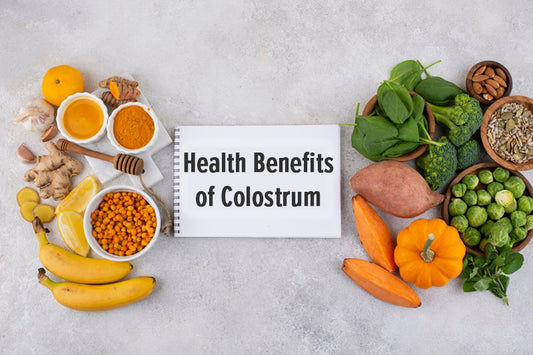Welcome back to our Gut Health Week series! In the previous blog, we dived into the fascinating world of fermented foods and explored how sauerkraut, kimchi, and kombucha can benefit your gut health. Today, we’re going to delve deeper into the complex ecosystem that resides within our bodies - the gut microbiome. We’ll explore its crucial role in maintaining a healthy body and how our lifestyle choices can impact this delicate balance.
The Gut Microbiome
The human gut resembles a thriving community, hosting trillions of microorganisms. This diverse assembly, collectively referred to as the gut microbiome, comprises bacteria, viruses, fungi, and various other microbes. Each of these minuscule inhabitants assumes a distinctive role, collaboratively orchestrating a delicate equilibrium essential for the maintenance of human health.
The microbiome is like our fingerprints and affects our well-being. Our internal microbial landscape is constantly changing. This change is influenced by factors such as our diet, lifestyle, age, and health.
Role of Gut Microbiome
The influence of the gut microbiome extends beyond the gut; it has far-reaching effects throughout the human body. Research has shown that these microscopic inhabitants play a role in influencing the human genome, affecting gene expression and potentially impacting our susceptibility to certain diseases. Additionally, they contribute to the development and function of our immune system and mental health
Gut Microbiome and Digestion
One of the primary roles of the gut microbiome is aiding in digestion. Our gut microbes help break down complex carbohydrates and proteins that our bodies can’t digest on their own. They also produce essential vitamins like vitamin K and B vitamins, which are crucial for our overall health.
The gut microbiome also produces short-chain fatty acids (SCFAs), which have been linked to various health benefits, including anti-inflammatory effects and colon health. By doing so, they not only facilitate digestion but also contribute to nutrient absorption in the small intestine, ensuring that our bodies get the necessary nutrients from the food we eat.
Gut Microbiome and Immune System
The gut microbiome also plays a critical role in our immune system. It helps regulate our immune response and can influence our susceptibility to certain diseases. A healthy gut microbiome can help prevent the overgrowth of harmful bacteria and other pathogens.
It does this by competing for resources and space, essentially crowding out potential pathogens. Furthermore, some gut microbes can stimulate the immune system to produce antibodies against certain pathogens, enhancing our body’s ability to fight off infections.
Gut Microbiome and Mental Health
Recent research has suggested a link between the gut microbiome and mental health. This connection, often referred to as the “gut-brain axis,” suggests that changes in the gut microbiome could affect mood and behavior. Some gut bacteria produce neurotransmitters, like serotonin and dopamine, which play key roles in mood regulation.
Imbalances in the gut microbiome have been associated with mental health disorders like depression and anxiety. While this area of research is still new, it holds promise for future treatments of mental health disorders.
Connection to Health Conditions
Studies show that an unhealthy gut is connected to many health problems, emphasizing the importance of a balanced gut microbiome.
- Dysbiosis: It is consistently associated with the development and exacerbation of irritable bowel syndrome (IBS). Individuals experiencing IBS often exhibit an altered gut microbiome composition, characterized by an imbalance in specific microbial populations. This disruption can contribute to the manifestation of gastrointestinal symptoms such as abdominal pain, bloating, and irregular bowel habits.
- Inflammatory Bowel Disease (IBD): Studies have illuminated the connection between dysbiosis and inflammatory bowel disease (IBD), encompassing conditions like Crohn's disease and ulcerative colitis. An imbalanced gut microbiome can potentially exacerbate the inflammation seen in these disorders. Understanding and addressing dysbiosis become crucial in the management and prevention of flare-ups in individuals grappling with IBD.
- Type 2 Diabetes: The gut microbiome affects metabolic health, especially about type 2 diabetes. Research has unveiled links between dysbiosis and insulin resistance, a key player in the development of type 2 diabetes. The various types of microbes in the gut impact the body's ability to regulate blood sugar levels. This highlights the significance of maintaining a healthy gut for overall metabolic health.
Maintaining a Healthy Gut Microbiome
Maintaining a healthy gut microbiome is essential for overall health. This can be achieved through a balanced diet rich in fiber, regular exercise, adequate sleep, and avoiding unnecessary antibiotics. Let's explore it.
- Balanced Diet: A balanced diet rich in fiber is paramount for nurturing a flourishing gut microbiome. Ensure a diverse intake of fruits, vegetables, whole grains, and fermented foods. These dietary choices provide the necessary nutrients and fibers that support microbial diversity and maintain a harmonious balance within your gut.
- Fermented Foods: Continuing our exploration from the previous blogs, fermented foods like sauerkraut, kimchi, and kombucha are your allies in promoting gut health. These foods are teeming with beneficial bacteria that contribute to a robust and diverse gut microbiome. Make them a regular part of your diet for sustained microbial support.
- Regular Exercise: Physical activity extends its positive influence beyond your muscles; it also benefits your gut. Studies have shown that regular exercise promotes a diverse and healthy gut microbiome. Aim for at least 30 minutes of moderate exercise most days of the week to keep both your body and your gut in good shape.
- Prioritize Sleep: Quality sleep is more than just rejuvenation for your body; it's a crucial factor in maintaining a healthy gut microbiome. Poor sleep patterns have been linked to disruptions in microbial balance. Strive for 7-9 hours of uninterrupted sleep each night to support your overall well-being.
- Antibiotic Awareness: While antibiotics can be life-saving, their indiscriminate use can disrupt the delicate balance of your gut microbiome. Only use antibiotics when prescribed by a healthcare professional, and be sure to complete the full course. Consider incorporating probiotics during and after antibiotic use to aid in the restoration of beneficial bacteria.
- Stress Management: Stress can take a toll on your gut health. Chronic stress has been associated with alterations in the gut microbiome composition. Practice stress-reducing techniques such as meditation, deep breathing exercises, or engaging in hobbies to support a healthy balance within your gut.
Impact of Processed Foods:
The modern diet, with lots of processed foods and little fiber, harms the balance of the gut microbiome. Processed foods can disrupt the balance of good bacteria in your gut. This is because they contain high amounts of sugar, bad fats, and artificial ingredients.
As a result, dysbiosis may occur. This imbalance can have far-reaching effects on our overall health, contributing to issues such as inflammation, obesity, and even mental health disorders.
Furthermore, processed foods often lack the dietary fiber that our gut microbes rely on for nourishment. Dietary fiber acts as a prebiotic, feeding the beneficial bacteria in our gut and promoting their growth and diversity. Not enough fiber in your diet can reduce the variety of microbes in your gut, upsetting the balance.
Conclusion:
The gut microbiome plays a pivotal role in our health and well-being. From aiding digestion to influencing our genes, these microscopic inhabitants have a significant impact on our bodies.
To be healthy, we must take care of our gut microbiome. Understanding its importance in maintaining a balanced gut is crucial. Stay tuned for further insights into optimizing your gut health in the upcoming blogs of Gut Health Week.






